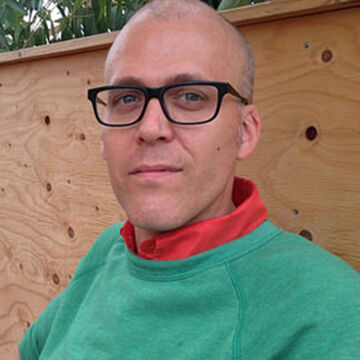

Patrick Durgin
Associate Professor, Adjunct
Contact
Bio
Associate Professor, Adj. BA, 2000, University of Iowa; MA, 2003, PhD, 2004, State University of New York at Buffalo. Publications: Nightboat Books, 2026; "from Exegeses." (Bathhouse Journal, 2024); “from Tournament.” (Big Other, 2022); “from Tournament.” (Blackbox Manifold, 2022); French Unpublished Poems & Facsimile 1958–1960 (Letra Muerta, 2022); The Canary #7 (2021); “from Case Comparison.” (Chicago Review, 2020). “Hannah Weiner’s Transversal Poetics: Collaboration, Clairvoyance, and Disability.” The Matter of Disability (University of Michigan Press, 2019); “Interference” performance text. Emergency Index (Ugly Duckling Presse, 2017); “Art Words” roundtable with James Elkins et. al. School of the Art Institute Summer Theory Institute/VCS publication (2017); “Imitation Demise.” Institutional Garbage exhibition catalog, Sector 2337 and Hyde Park Art Center, Chicago (2016); “Stupendous Lore.” A Forest on Many Stems: Essays on the Poets Novel (Nightboat Books, 2020); Zenith (Green Lantern Press, 2016); “Disaster and Revival.” Jacket2 “Global Conceptualisms” dossier (2015); Rpt. Aerial 11: Contemporary Poetics as Critical Theory (2015); "Witness." Jacket2 Commentaries (2014); “Prelude to PQRS.” The Volta 39 (2014); “Big Sensible: Introductory Remarks on Clairvoyant Journal.” Jacket2 and f-u-t-u-r-e.org (2014); Singles (2014); Daughter (2013); “Lyn Hejinian: Intention, Selection, and Fantastic Philosophy.” Something on Paper (Naropa University, 2013); PQRS (Kenning Editions, 2012); “New Life Writing.” Jacket2 (2012); Review of Adorno’s Noise, by Carla Harryman. (Postmodern Culture, 2010); “Post-Language Poetries as Post-Ableist Poetics.” Journal of Modern Literature (2009). The Route (Atelos, 2008); Imitation Poems (Atticus / Finch, 2007); Sorter (Duration Press, 2001); The Matter of Disability; Chicago Review; Contemporary Women's Writing; Cross-Cultural Poetics; Denver Quarterly; Disability Studies Quarterly; Jacket2; Journal of Modern Literature; Postmodern Culture, Emergency Index, and others. Editor: Hannah Weiner's Open House. Exhibitions: Artaud in Amerika (Radio Play) (Festival of Poets Theater, Chicago 2017); Institutional Garbage (Chicago, 2016); Recent Acquisitions, (Textsound 2016); Pulse Art and Technology Festival, "Gesture to Exit" (Non Fiction Gallery, Savannah, GA, 2015); Interference (Poets Theater Festival, Chicago 2015). Readings: EXC Librarie, Paris (2024); General Readings, Chicago (2023); Maison de la poesie, Paris (2022); Seminary Co-op at University of Chicago (2020); Wolfman Books (Oakland, 2019); Poetic Research Bureau (Los Angeles, 2019); Poetry Foundation, Open Door Series (Chicago, 2020) and Arts Club of Chicago and Renaissance Society, “An Adventure Was Home: Gertrude Stein in Chicago” event (Chicago, 2015); Poetic Research Bureau (Los Angeles, 2013); Red Rover Series (Chicago, 2011); Felix Series (Madison, WI 2011); Series A (Chicago, 2010); Danny’s Series (Chicago, 2010); Segue Series (New York, 2009); Poetry Project (New York, 2008); Myopic Books (Chicago, 2008); Woodland Pattern (Milwaukee, 2008); The Route/Imitation Poems readings at Kootenay School of Writing in Vancouver, The Spare Room in Portland, Emergent Forms series in Ashland, San Francisco Poetry Center, UC Santa Cruz, and The Smell in Los Angeles (2007); MLA Off-Site Reading (Arts Alliance, Philadelphia, 2006; D.C. Four Seasons, 2005; Highwire Gallery, Philadelphia, 2004); Discrete Series (Chicago, 2005); Carl Rakosi 100th Birthday Celebration at Beyond Baroque (Los Angeles, 2003); Geary Street series (San Francisco, 2003); New Brutalism series (Oakland, 2003); In Your Ear series (Washington DC, 2002); Rust Talks series (Buffalo, 2002), Canessa Park series (San Francisco, 2000); Words of Light series (Chicago/Iowa City, 1999).
Personal Statement
I regularly teach an introduction to the work of Gilles Deleuze and a series of courses on language as artistic medium. I also teach literature and poetics courses. My pedagogy is balanced between free-associative discussion and lecture, in addition to research and recursive writing. I have great admiration for my students who possess a capacity for risk and deliberation, a difficult combination to sustain.
I have taught at the School of the Art Institute of Chicago since 2007. I teach in the Visual and Critical Studies, Liberal Arts, Art History, Writing, and Arts Administration and Policy programs. I am a poet and critic, translator, editor and small press publisher, book artist and performance curator, and I occasionally make sound and text-sound work. My teaching focuses on visual culture, poetics, post-structuralist and contemporary critical theory, philosophy, art history, disability studies, Civil Rights and Black Power movement “protest literature”—especially the work of Richard Wright and James Baldwin—and visual prosody—especially as it intersects with Conceptual Art and Conceptual Writing in the 20th and 21st centuries.
I have taught in the Writing Program at SAIC, the MFA Program in the School of Art and Art History at the University of Illinois, Chicago, the English Language & Literature Department of the University of Michigan, Ann Arbor, The Liberal Arts Program at the University of St. Catherine, Minneapolis, and the English Department of SUNY, Buffalo. I was founding publisher and editor of Kenning Editions from 1998 to 2024, and from 2015 to 2017, I co-curated the Festival of Poets Theater in Chicago.